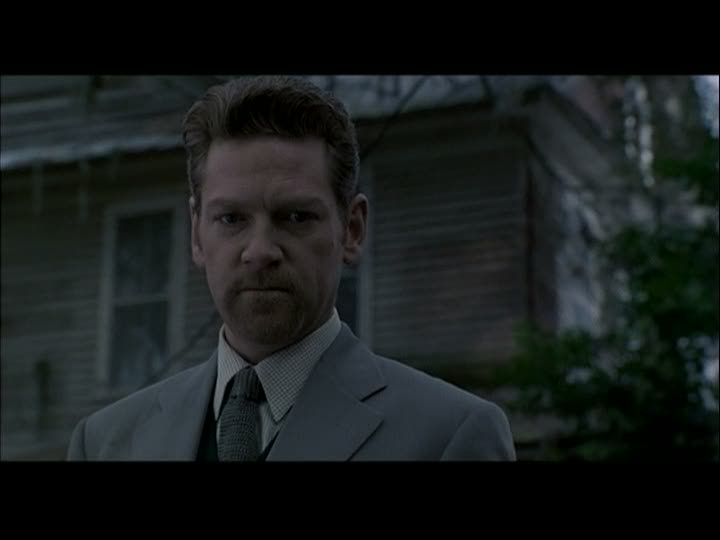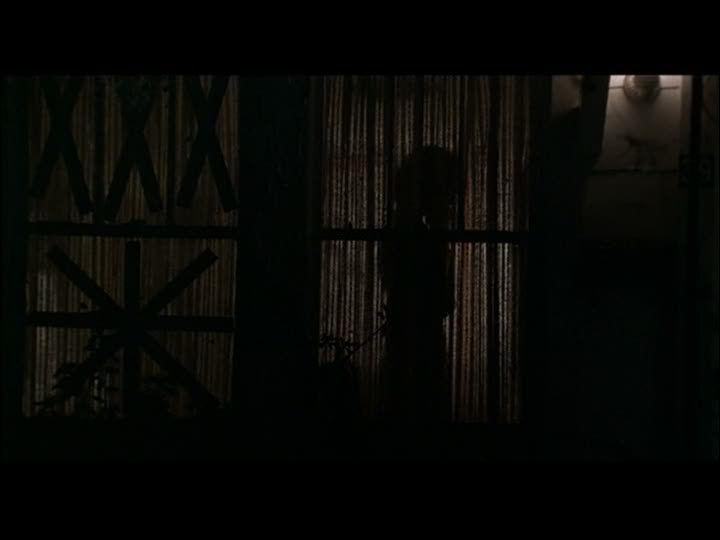
A John Grisham potboiler would seem an unlikely subject for director Robert Altman, who nevertheless made Grisham's The Gingerbread Man his own, mapping the familiar Altmanesque casual pacing and loose aesthetics onto this lurid thriller plot. The film opens with a lengthy aerial shot of a Southern delta on an overcast day, suggesting a storm about to come. Indeed, the entire film is building towards the not-so-threateningly-named Hurricane Geraldo — not the TV personality, as one character wryly points out. Altman is essentially telegraphing the Short Cuts-style ending that he so loves, writing the internal anguish of his characters onto the landscape itself, into nature, which grows more and more ugly and sinister as the central character, the lawyer Rick MacGruder (Kenneth Branagh), spirals into confusion and despair. From the beginning, we know that a storm, both emotional and physical, is coming, and its threat hangs over the whole movie, even when the sun briefly breaks out.
This tension and moody build-up adds some much-needed heft to the film's rather silly and convoluted story, built on a series of genre clichés and reversals of expectations: the dark-haired, sexed-up damsel in distress (or femme fatale?) and the sinister, crazy hillbilly. MacGruder's downfall begins when he gets wrapped up with the waitress Mallory Doss (Embeth Davidtz), who strips off her clothes at the slightest provocation and quickly embroils MacGruder in a tale about her crazy father, who's been stalking and harassing her. The lawyer, who normally wouldn't think of doing anything not on the payroll, is suddenly convinced that he can do a good deed for this woman he wants so badly, and he helps her commit her nutty father, the unruly wild man Dixon Doss (Robert Duvall, communicating menace with his clear blue eyes and language of grunts and muttering). This is only the beginning, of course, as Dixon quickly escapes from the mental institution with the help of his hillbilly posse, and goes cavorting off through a graveyard in a wonderfully silly/creepy night scene, wisps of fog hanging over everything, white and fluffy in the darkness.
The film's plot takes some increasingly loony twists and turns from there, but it's clear that Altman isn't so much interested in delivering a satisfying genre experience so much as just riffing on all these unlikable characters. Certainly, MacGruder is an astonishingly rotten protagonist: a self-centered jerk, a womanizer, and of course that oldest of crime fiction archetypes, the high-priced defense lawyer who keeps getting "scum" released back onto the streets. He's divorced from Famke Janssen's Leeanne, who's taken up with the couple's divorce lawyer now; another genre cliché fulfilled. When MacGruder gets his kids for visits, he's so inattentive that he lets them wander off everywhere while taking cell phone calls, even when he starts receiving threats about them, presumably from the missing Dixon. All this lazy parenting sets up the wonderfully handled late scene where MacGruder is making a call at a phone booth, with a visual line of sight to his kids through a hotel room window across the way, when a truck pulls up right in front of him, cutting off the view; it's a great sight gag and also a piece of formalist visual suspense worthy of Hitchcock.

There are many other pleasures to be found here as Altman lazily meanders through this story. There's a great shot where Mallory lights a cigarette and Altman syncs the flash of the lighter's flame against the cigarette tip with a crack of thunder outside, making a simple gesture seem epic. At the finale, all this sturm und drang pays off in the fantastic hurricane sequence, which makes suspense from missed cell phone connections and the flickering of lights, where everyone is silhouetted in windows, framed against the stormy perpetual night outside. MacGruder goes running around through the storm like a lunatic, always missing the obvious, always thrusting himself into danger — he's a totally incompetent thriller hero, but the film's arc is about him realizing what a lousy guy he's been, deciding at the end to stop fighting, that he deserves what he gets, that he shouldn't try to wriggle out of it even if he probably could. Meanwhile, Altman's camera is as busy as ever, using zoom as a device to make right-angle turns within a scene, unexpectedly pointing out details of interest, as when a slow zoom into a meowing cat foreshadows its grim fate.
Altman also has some fun with the character of MacGruder's private detective, Clyde Pell (Robert Downey, Jr.). Downey is always a blast to watch, and his leering, drunken private eye is a welcome presence in this film that so thoroughly mocks thriller conventions: just as the hero is a jerk who's blind to what's going on around him, the detective is sloppy but also strangely effective, always seeming to know exactly what's going on. In one of the film's funniest scenes, while Mallory is taking a call from MacGruder, Clyde lurks outside, pressing his ear against a window, listening in. Altman is frequently composing in depth like this, shooting with windows revealing crucial information or sight gags outside, like the spectacle of Downey exaggeratedly listening in, his whole body leaning in towards the phone conversation. Even funnier are the scenes with Downey hanging out in a bar with a couple of trashy-looking girls; when he's pulled away for a case, the girls shrug, look at one another, and kiss, as though with him gone they'll just have to settle for each other tonight. These little throwaway touches are so obviously Altman's work, infusing some quirky eccentricity into a film that could've been a paint-by-numbers thriller.
On the whole, The Gingerbread Man is a rather slight and goofy offering from Altman, a film that finds the director dabbling once more in the thriller genre. It lacks the self-assurance and thematic depth of his better genre deconstructions like The Player or The Long Goodbye, but it's nevertheless a fine example of Altman playfully mixing together noir and legal thriller conventions into an off-kilter confection. The film is more satisfying for its textures, for its small touches, than for its actual plot.









0Awesome Comments!